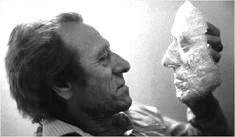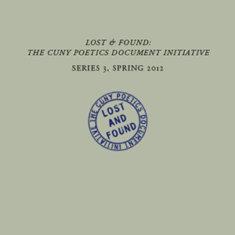Editor: Lindsey M. Freer
59 pages, softcover, saddle-stitch binding
The Charles Olson Memorial Lectures, a feature of life at SUNY Buffalo in the 1980s, were given each year by a single distinguished poet, who came to the university to share his or her thoughts on poetics, Olsonian and otherwise, with an engaged audience. This pamphlet transcribes and presents two of Edward Dorn’s three Olson Memorial Lectures, given in the early spring of 1981. Over the course of these wide-ranging talks, Dorn takes on his own relationship to Olson’s poetic practice, as well as the shift toward conservatism in American culture in the early years of the decade. Drawing upon Olson’s final lectures, letters and field reports from friends, and his own recent writings, Dorn uses these talks to synthesize a new set of interpretive tools for poets working within the scope of the totalizing gaze of Reagan’s America.
Author Biography:
EDWARD DORN (1929-1999), protégé of Charles Olson and deep poet of the American West in his own right, was born in Villa Grove, IL and came of age in that Midwestern prairie town during the Great Depression and the Second World War. He studied for several years with Olson at Black Mountain College, and although poets who were involved with the college have often been grouped together as the "Black Mountain poets," Dorn told David Ossman in The Sullen Art that he has "been unable to find any similarity" among the writers associated with the school. Discussing his own inclusion in the group, Dorn added: "I think I'm rightly associated with the Black Mountain 'school,' not because of the way I write, but because I was there." He began composing poetry during his family’s itinerant wanderings across North America in the late 1950s. In 1961, he began teaching at the University of Idaho, and after four years there, during which his first two books of poetry were published, he collaborated with photographer Leroy Lucas on a road trip through the “Basin-Plateau”—a journey chronicled in The Shoshoneans (1966). In late 1965, he took a position at the University of Essex, where he began to compose the now classic long poem, Gunslinger. Dorn’s return to North America in the early seventies saw the completion and single-volume publication of Gunslinger (1974), as well as an experiment in periodical publication, Bean News. In 1977, he began teaching at the University of Colorado, Boulder, and in the 1980s, published Rolling Stock, a journal of diverse poetic, personal, and cultural interests, with his wife Jennifer Dunbar Dorn. Rolling Stock’s motto—“If it moves, print it!”—also encompassed Dorn’s approach to his own later work, which variously included a withering portrayal of academic life in Captain Jack’s Chaps (1983), a collection of what poet Tom Raworth called “savage observations” (Abhorrences, 1990), and his poetic reflections on cancer and chemotherapy—published posthumously as Chemo Sábe in 2001. Dorn remained in Colorado until his death in 1999.
In Series 1, Lost & Found published a selection of Dorn’s correspondence with his close friend Amiri Baraka (edited by Claudia Moreno Pisano); numerous larger Dorn projects are on the horizon, including a volume of collected poems (from Carcanet), collected prose, and a reprint of The Shoshoneans, edited by M.R. Hofer (University of New Mexico Press), and the complete Baraka Dorn correspondence, edited by Claudia Moreno Pisano, also from the University of New Mexico Press.
Selected Archives:
- PennSound, http://writing.upenn.edu/pennsound
- Edward Dorn Papers, Thomas J. Dodd Research Center, University of Connecticut, Storrs, CT


